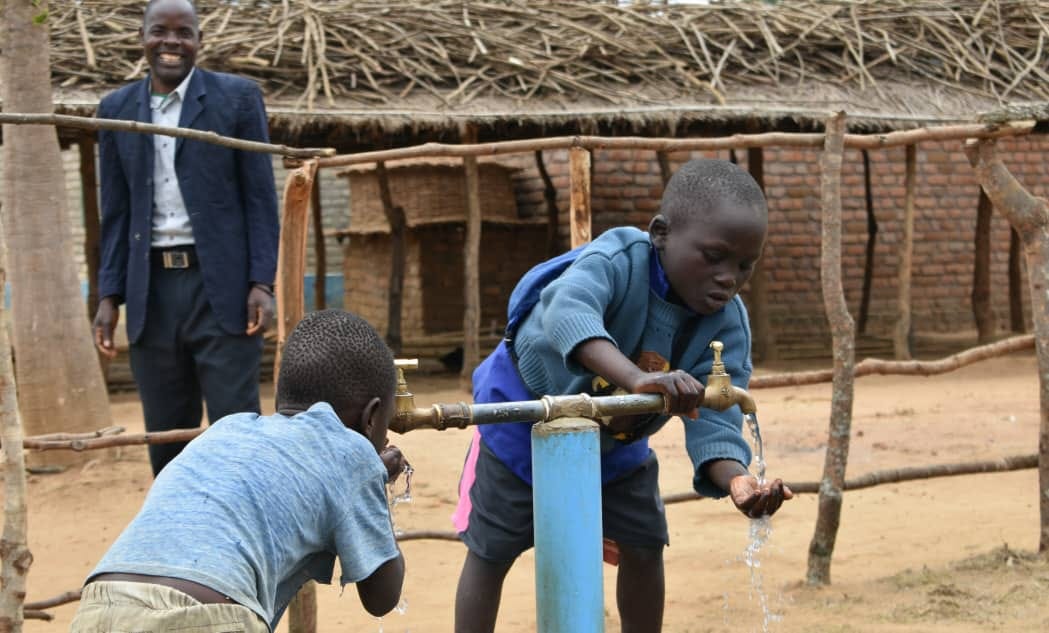Improving Lives: Nacro's WASH Project Transforms Sanitation, Hygiene, and Access to Clean Water in Mchinji District
This change is the result of the proactive engagement and intervention of the New Apostolic Church Relief Organisation (Nacro), which has enabled this significant development.
Mchinji, Malawi – A remarkable transformation in sanitation, hygiene, and access to clean water has swept through the rural communities under the jurisdiction of Traditional Authority (TA) Mduwa in Mchinji district, writes Howard Mlozi.
This change is the result of the proactive engagement and intervention of the New Apostolic Church Relief Organisation (Nacro), which has enabled this significant development.
Located approximately 50 kilometres from Mchinji boma, these rural communities have transitioned from consuming water from unsafe sources, often shared with animals, to now having access to piped water.
Furthermore, certain schools and under-five clinics have been equipped with modern toilets, enabling students and community members to uphold vital hygiene practises.
Chief among the reasons for the success of the project is the active participation of the community. Group Village Headman (GVH) Mkangala, a respected local chief, commended the vital role that community involvement played in the project's achievement.
"When Nacro arrived, they mobilised us to play a role in the water project. For example, the villages earmarked for the project voluntarily dug channels for water pipes, connecting them from the main tank source to their respective villages," Chief Mkangala shared.
He added, "We also formed water users committees to ensure the sustainable use of water, prioritise safety, and take charge of the maintenance of these facilities."
Importantly, the project has alleviated pressing challenges faced by women in their quest for portable water.
Chief Mkangala emphasised how "women and girls used to walk long distances, often during inconvenient hours, to fetch water from dambos.
Today, piped water is right at their doorsteps."
Anthony Ngwira, the National Coordinator of Nacro, detailed the history of the Water, Sanitation, and Hygiene (WASH) project in TA Mduwa. Launched in 2019, the project received funding amounting to K300 million from Nak-Karitativ, a German organisation.
One of the strategic interventions was the installation of solar pumping water systems in two GVHs, Mkangala and Kanyanda.
These solar systems facilitated the creation of eight piped water points, serving eight villages and benefiting 389 households, with an approximate population of 2,495.
The project also involved drilling six boreholes, each fitted with Afridev hand pumps. These included four community boreholes, one borehole for a primary school, and one borehole for a local church.
These 13 water points now benefit over 669 households, with a population of 4,356, including 911 primary school learners.
Moreover, the installation of 14 improved latrines, of which five are situated in primary schools, one at a market center, and another at an under-five clinic, has substantially benefited around 3,986 learners (comprising 2,085 girls and 1,901 boys), in addition to 1,000 traders and 250 mothers seeking care at the under-five clinic.
Mike Chilimmadzi, the Mchinji District Water Officer, emphasized how the project complements the government's efforts to expand access to safe water and enhance sanitation coverage among underserved communities through basic sanitation infrastructure and hygiene promotion in the targeted area.
The WASH project has also paved the way for the formation of 18 Village Savings and Loans (VSL) groups known as 'banki pa mjigo' and 'bank pa mpopi,' with a membership of 247 household members, comprising 45 men and 202 women.
The goal is to stimulate economic empowerment among users of the WASH facilities and ensure that a portion of their savings is allocated for the maintenance of these vital amenities.
Despite the project's success, Chief Mkangala revealed that it faces challenges due to financial constraints experienced by many households.
"Households are supposed to pay a small fee to use clean water, which is intended for facility maintenance. Regrettably, some households fail to fulfill this obligation," the traditional leader lamented.
He further pointed out that essential materials such as water tanks, pipes, and solar panels are expensive, making their repair and maintenance a challenging task with the limited funds generated from households.
Chief Mkangala has urged the government to establish a dedicated fund for the management of various development projects, particularly water facilities.
This measure could help sustain and expand initiatives like the one carried out by Nacro, further improving the lives of rural communities and promoting better sanitation and hygiene practices.



